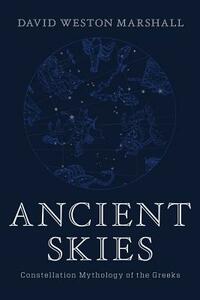Take a photo of a barcode or cover
informative
slow-paced
This had very little to do with the actual sky
slow-paced
This just wasn’t what I was expecting at all. It’s like Marshall either didn’t know what he wanted this book to be, or there were too many things he wanted to achieve, but the end result was that everything topic here was painfully superficial.
The first part is all on some of the prominent Ancient Greek myths that are associated with the constellations. If you have any familiarity with these then you won’t learn anything new, which is disappointing. I was hoping for more of an analysis on why the stars affected these myths, or vice-versa.
His conclusions in these myths are also classically, and disappointedly, pretty typical in how the Ancient Greeks treated women - as in, as an afterthought. Marshall chooses to ignore nuance. Most glaringly, Marshall justifies the many stories of rape (mostly by Zeus) by praising the accomplishments of the children (see - male children) born from it. In a time where academics are making real strides to include women in the narrative, and reflect on the role (or lack thereof) they often played in these stories, I expected a lot better from this.
The second part goes into the more practical aspects of how the stars affected the behaviours in Ancient Greece, particularly in farming and sailing. However, saying second “part” is very rich, since it’s really only the last fifth of the book. In this, I don’t understand where Marshall gets his information from, and it’s difficult to discern if he’s still referencing stories or Ancient Greek practise. He references Homer and Ptolemy in the same breath, but doesn’t distinguish why he is drawing conclusions with these two vastly different sources.
He goes into obtuse detail on the work required in farming practises, disregarding the relationship with the stars, but then doesn’t reference any sources outside ancient written word. Marshall, the philosophers and poets weren’t farming. They’re excellent sources yes, but not when used on their own. Where is your archeology? What has actually been found?
So his conclusions are superficial. He doesn’t put in any work in shaping a cultural understanding on how the stars affected the Ancient Greeks, nor does he give a reason as to why he structured the book the way he has.
This part also feels incredibly disconnected from the rest of the book, which is a shame because this had the potential to be fascinating. The behaviour of the everyday people in the Ancient world is completely up my alley, and should have therefore, been something in this book that I should have really enjoyed.
So what is this? Does Marshall want this to be an exploration of culture, or myth? While the two are definitely connected, he doesn’t put much time in drawing these connections.
This is a very introductory book, but I don’t think it’s a strong introductory book. The myths aren’t nearly as engaging as other introductory texts, and the last section on farming and sailing is so out of left field, that many people who would pick this up simply wouldn’t be interested. Much more work that wasn’t done, needed to be done, to change this.
As an aside, there’s some pretty sweeping generalised statements in here that I always find incredibly frustrating when not approached with any nuance, which of course, Marshall didn’t.
The Ancient Greeks were the first philosophers, for example? I think China would have something to say about that.
The Ancient Greeks pioneered using the stars to develop farming calendars? Indigenous peoples are lining up to say otherwise, I think Indigenous Australians are first in line.
I just truly don’t understand what Marshall was trying to achieve here, but whatever it was, I didn’t enjoy it.
One star for Big and Little Bear. I appreciated that one.
The first part is all on some of the prominent Ancient Greek myths that are associated with the constellations. If you have any familiarity with these then you won’t learn anything new, which is disappointing. I was hoping for more of an analysis on why the stars affected these myths, or vice-versa.
His conclusions in these myths are also classically, and disappointedly, pretty typical in how the Ancient Greeks treated women - as in, as an afterthought. Marshall chooses to ignore nuance. Most glaringly, Marshall justifies the many stories of rape (mostly by Zeus) by praising the accomplishments of the children (see - male children) born from it. In a time where academics are making real strides to include women in the narrative, and reflect on the role (or lack thereof) they often played in these stories, I expected a lot better from this.
The second part goes into the more practical aspects of how the stars affected the behaviours in Ancient Greece, particularly in farming and sailing. However, saying second “part” is very rich, since it’s really only the last fifth of the book. In this, I don’t understand where Marshall gets his information from, and it’s difficult to discern if he’s still referencing stories or Ancient Greek practise. He references Homer and Ptolemy in the same breath, but doesn’t distinguish why he is drawing conclusions with these two vastly different sources.
He goes into obtuse detail on the work required in farming practises, disregarding the relationship with the stars, but then doesn’t reference any sources outside ancient written word. Marshall, the philosophers and poets weren’t farming. They’re excellent sources yes, but not when used on their own. Where is your archeology? What has actually been found?
So his conclusions are superficial. He doesn’t put in any work in shaping a cultural understanding on how the stars affected the Ancient Greeks, nor does he give a reason as to why he structured the book the way he has.
This part also feels incredibly disconnected from the rest of the book, which is a shame because this had the potential to be fascinating. The behaviour of the everyday people in the Ancient world is completely up my alley, and should have therefore, been something in this book that I should have really enjoyed.
So what is this? Does Marshall want this to be an exploration of culture, or myth? While the two are definitely connected, he doesn’t put much time in drawing these connections.
This is a very introductory book, but I don’t think it’s a strong introductory book. The myths aren’t nearly as engaging as other introductory texts, and the last section on farming and sailing is so out of left field, that many people who would pick this up simply wouldn’t be interested. Much more work that wasn’t done, needed to be done, to change this.
As an aside, there’s some pretty sweeping generalised statements in here that I always find incredibly frustrating when not approached with any nuance, which of course, Marshall didn’t.
The Ancient Greeks were the first philosophers, for example? I think China would have something to say about that.
The Ancient Greeks pioneered using the stars to develop farming calendars? Indigenous peoples are lining up to say otherwise, I think Indigenous Australians are first in line.
I just truly don’t understand what Marshall was trying to achieve here, but whatever it was, I didn’t enjoy it.
One star for Big and Little Bear. I appreciated that one.
adventurous
informative
lighthearted
slow-paced
Unexpected change from the rushed stories relating to the constellations to the development of our understanding of the planet for navigation using astrology which was very interesting.
informative
inspiring
relaxing
medium-paced
Listened to the audiobook.
The first half was a descriptive telling of the 48 classic constellations, which is exactly what I was after. I probably would have benefitted from looking at a map to accompany the physical descriptions and placements in the sky, but knowing the myths behind the names was my main interest.
Part 2 (Chapters 7-10) turned into a mundane history of sailing and nautical navigation with occasional references to the star groups previously mentioned. The biggest distraction being every time the narrator said the word "sea men" I had to visualize the spelling to stop myself from chuckling aloud.
The first half was a descriptive telling of the 48 classic constellations, which is exactly what I was after. I probably would have benefitted from looking at a map to accompany the physical descriptions and placements in the sky, but knowing the myths behind the names was my main interest.
Part 2 (Chapters 7-10) turned into a mundane history of sailing and nautical navigation with occasional references to the star groups previously mentioned. The biggest distraction being every time the narrator said the word "sea men" I had to visualize the spelling to stop myself from chuckling aloud.
informative
informative
fast-paced
informative
fast-paced
Very efficient and informative text. I enjoyed the last part on farming, shepherding and sailing by the stars, which added some immersive context for the world in which these stories of the sky took shape.
challenging
informative
slow-paced




